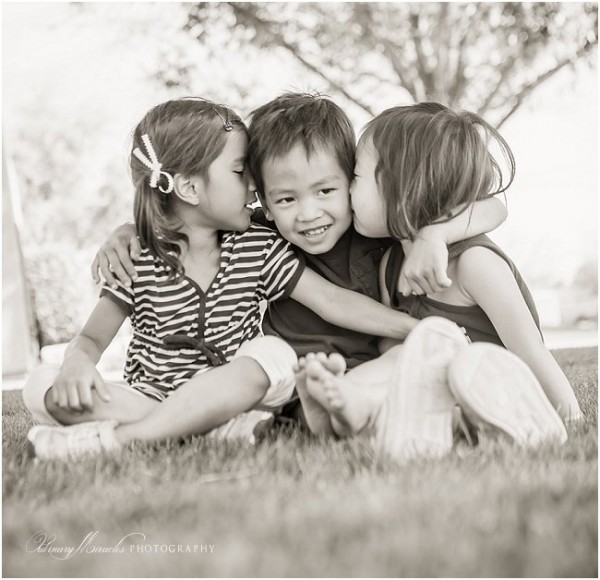{Part I, Dark brown hair, Light brown hair is here}
It’s discussed pretty regularly in the adoption community.
To test or not to test.
Now just to make sure we’re all on the same page here, I’m not talking about genetic testing as advised by your doctor for medical reasons. I’m talking about genetic analysis for children who are growing healthy and strong. I’m talking about collecting some spit, sending it in the mail to a lab, and a relatively inexpensive genetic testing of our children that were adopted to find out more information about them, like what ethnicity they are, the rare chance of finding distant (or not) relatives, and health information. There are several companies that are doing this including 23&me, FTDNA, DeCodeMe, and DNATribes to name just a few.
There are kinda two camps on the subject, (not to mention those of us that waffle around in the middle) and personally I think there are some really important things to think about from both points of view. Our children from international adoption come to us with so very little. Few material possessions if any. Little to no information about who they are or where they come from. So giving them any little additional morsel of who they are seems like a good thing… right?
Well… maybe not. It’s not really so cut and dry and should requires some thought.
Camp A
As parents we can gather that information and present it to our children when we feel it will ultimately benefit them the most. This can include information about their genetic make-up and/or birth families. Maybe we explain and discuss the test results right when we get the results. Maybe children are part of the search or maybe they’re too little yet to participate and understand. Maybe it becomes as much a part of our child’s story as their country of birth. Maybe we use this information to find and possibly connect with biological family members and possibly start a dialog or relationship. Or we might decide keep all this information under lock and key until a child desires to know more or the time seems right. But information is just one of many tools we can use to help our children learn more about who they are, where they come from, their genetics, and the results of the testing can be used (or not) in a variety of ways to help heal the wounds that remain from the loss that comes as an inherent part of international adoption.
After all, our biological children already get to have all this information at their disposal. They can use ancestry.com and look up their family trees and know that great great grandma Sally came over from Sweden. They know who has glaucoma, who died of heart disease and who their cousins are. So shouldn’t we try to give our adopted children the same information and “level the playing field” rather then leave them with empty holes that might be able to be filled?
or
Camp B
The process of gathering information should be up to the child since that information is theirs alone. Children who are adopted come from a place of loss and have so very much taken from them. They have little to no control about where they go or who they will live with. So shouldn’t we leave at least some of the power to discover who they are up to them? Shouldn’t we “facilitate” their search on their terms rather than satisfy our own curiosity to know who they are? The resulting information after all is theirs and not ours as parents to uncover. It is a decision that they can make all on their own, and if they ever come to us and say, “Hey Mom, I’d like to do that testing thing,” only then should we guide them on their own journey to genetic testing, as initiated by the child. After all their genetics won’t change over time, so there is no rush to get the test done. A child can have testing done years or even decades later without changing the results or losing information. And as children grow to teenagers and adults they have better skills to process the information they will find, and it should be their decision alone.
And let us not forget that there is every possibility that the information revealed from genetic testing may open a can of worms. Health histories. Maybe no information at all that will help a child heal their wounds of loss. There are of course no guarantees. Genetic testing, no matter how much hope or information it provides, will never “fill the hole” for adoptees. Our children come to us from a place of loss. It can be like a hole void of information. And a place of no control. Our children lost it all when they came into our lives and into their forever families. They lost who they were, a language, a community, security, their heritage and more. And let us not forget that they likely lost it all in a split second and had no say in the matter. So even in our efforts to help them learn more about their identities, we must be sure not to take their power to learn about themselves.
As parents of a child that is internationally adopted, it is very natural to “miss” those early years before they came into our arms. As their mama, I too missed out on their first steps and giggles, and very much want to know as much about our children as I can. But does OUR parental desire to put all the puzzle pieces together outweigh their right to privacy and their right to their journey of self-discovery? Even if their journey may be totally separate and apart from us, their moms and dads?
About a year after Tess and Jude came home we did decide to have Tess genetically tested to hopefully give her a “community” to genetically identify with. In a world full of boxes, she just doesn’t fit into any of them and we worried about the implications of a grown up without a box to identify with. Four years later, we realize that the results of the test really didn’t provide us with any concrete answers. Duh. We certainly don’t regret having the testing done, but it surely didn’t satisfy any curiosity or tell us much more about who she is. She our daughter after all and we already knew that.
And off and on we wrestle with if we should use a different company and have the test performed again, or have Mimi and Jude tested. To be honest, I’ve been way too busy with dirty laundry and dust bunnies to sit down and come to a resolution with Papa about whether or not we should do it. Yes, we’re curious about our children’s background. But this is our curiosity and certainly not “child initiated” at this point. And I’m coming to the realization that the longer we have our children with us, the less that it matter to me who they are and where they come from. Our children are His first and foremost, ours after that, and no test results, ethnicity, or genetic markers will change that.
Still, I very much believe that information is inherently good and a powerful tool. The jury is still very much out, and we’ve yet to decide whether or not to have our adopted children genetically tested.
We’d love your input!
 Tess & Jude adopted from Vietnam in 2008 and Mimi via China in 2012
Tess & Jude adopted from Vietnam in 2008 and Mimi via China in 2012
To be continued… Part III {Birth family search from an adoptee’s perspective}



























We just decided to do this! We are using ’23 and me’ after hearing many stories of finding a ‘3rd or 4th’ cousin. I mean it is a 3rd cousin but who cares!! It is someone they can connect with instead of floating around in the world wondering ‘who am I biologically’?
The test was $100.
Unfortunately, I just got the vile and they want a lot of spit from my 3 year old. Unfortunately she is too young to give it yet (she tried to spit bless her heart a ton). I am going to call to see if they can just send me a blood test, LOL. A lot easier then all of this spit!!